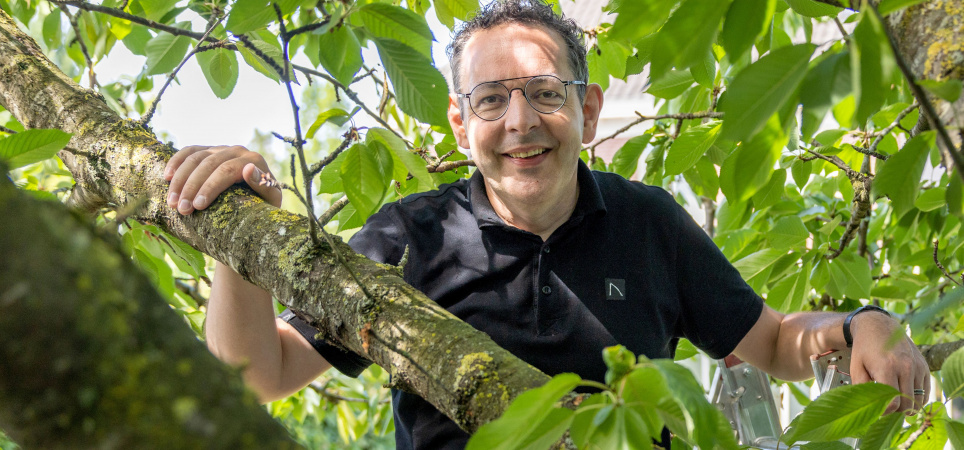You have to learn to reflect
Reflection is often a 'must' and reflection reports are full of clichés. That could be better, says teacher Sander Berendsen. “Create free space in class and be curious.”

Image: Angeliek de Jonge
How did you do it, what did you feel about it, what did you learn from it? These are the standard questions that must be answered in a reflection report. “Students have to reflect so often that they sometimes just come up with something to get rid of or what they think the teacher wants to read,” says Sander Berendsen. "That doesn't make sense."
This article is from the September issue of Education. Do you want to stay informed of everything that is going on in education? Join the AOb and receive the Education magazine every month.
CHECK ALL THE BENEFITS OF MEMBERSHIP
Based on the premise that everyone learns anytime and anywhere, Berendsen, innovation teacher at the ROC Graafschap College in the Achterhoek, developed the methodology 'Learning from stories'. He asked students the question: where did you learn the most? “Then I heard all sorts of things – at home, on an internship, at the sports club, with friends – except school.” When he thought about it, he understood. An insight or learning moment can arise anywhere, and not necessarily at a scheduled hour in the class schedule or when there is a deadline. "When is reflection useful? When it is meaningful for the learner. That is an open door that is often closed in practice. Meaningful experiences do not take place at fixed times. "The best conversations arise unexpectedly .”
Role model
He collected his insights and experiences in the book 'Learning from stories – a method for reflective development conversations that really matter'. “While writing, I wondered:
when have I reflected meaningfully myself?” An experience becomes meaningful when accompanied by an emotion, because it is unique to the learner, regardless of level or background'.
Berendsen himself came to the conclusion that his wife was pregnant, they had just moved, and was diagnosed with breast cancer in the same period. An aunt gave them a cherry tree that "had to get into the ground quickly" because it had been in the garden for far too long. “At the same time as taking care of the weakened tree, my wife was undergoing chemotherapy and radiotherapy.”
Reflection cannot be scheduled
“At that time, I felt supported by people who showed interest and listened without judgment. How are you now? What lives in you? A good question or a listening ear at the right time gave me the knowledge of mindset who helped me further.” The pregnancy was
closely monitored and the delivery of their second son was planned. “The moment the doctor called that there was a good chance of recovery and that Job could be born, I looked out the window and saw the cherry tree in bloom. The tree will make it and so will my wife and son, I thought.”
Dialogue
In the book he bundled the experiences of students, researchers, entrepreneurs, career counselors, administrators and managers about reflection. Van Jiska, for example, a pedagogical student who struggled with an eating disorder, got stuck and came out of it again by processing her insights about it in a booklet.
And from Boris, an economics student who was unmotivated in school, but who made a turnover of twelve thousand euros as a seller of telephone cases. Dialogue was an essential tool in their development. What makes you happy? What do you like to do? And also: Why are you at school? "Because we have to," said Boris. “During the lesson, he ordered Chinese phone cases, because the lessons did not interest him. Teaching him the lesson didn't bring the motivation back. The demand for a dream for the future eventually did, because he saw the usefulness of a diploma for a better start as an entrepreneur.”
spontaneous
“Meaningful reflection starts with the learner. With a conversation that does not necessarily take place at a fixed time. It is more beautiful when it arises spontaneously.” Remove reflection from mandatory deadlines and assessment, advises Berendsen. Focus on what gives a student energy, what is going well and what someone is willing to put in the effort. “Check whether the student suffers from a limiting conviction: 'I can't do this, because'.
Jiska, the student with the eating disorder, processed her experiences in a collection of poems. It became a project she will carry with her for the rest of her life. “With standard reflection report we could not have achieved this with her.” Meaningful reflection is about 'a real insight, an eye-opener, you can't direct it. The grass does not grow faster by pulling it. If you, as a teacher, adopt a curious attitude and ask questions, you effectively reverse the roles. In conversation you come to the themes that matter, what makes someone insecure or happy and there is room for growth.
Are you working on something special? Or do you know someone who fits into this series? Then let us know via onderwijsblad@aob.nl


